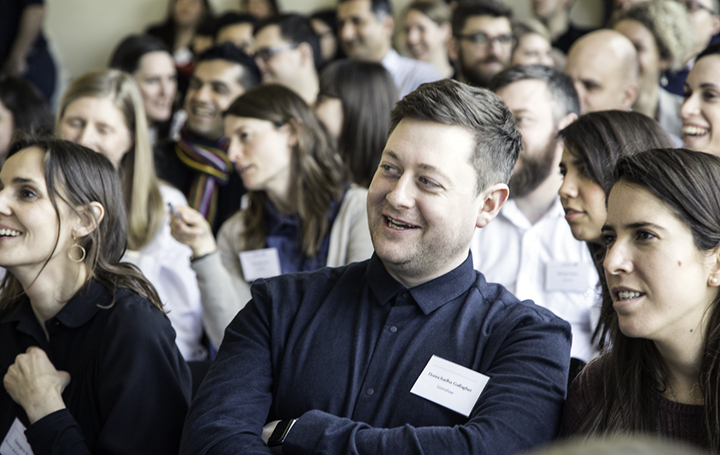If you have trained in architecture and followed a traditional career path, you will probably focus most on developing your skills as a working architect. Leadership, however, requires a completely different mindset. It is a role that goes well beyond thinking within your chosen profession, believes leadership coach Gordon Mackenzie.
On 28 March, Mackenzie will be joined by Grimshaw’s managing director Kirsten Lees and Feilden Clegg Bradley Studio’s managing partner Geoff Rich to deliver the first part of this year’s RIBA Future Leaders programme – Developing a Leadership Mindset.
Many people assume that leadership is not for them; that it is a personality trait some people have and others do not. But becoming a leader is a process. It is a skill we all can learn.
‘Architects and engineers are used to approaching projects as a process of many stages. So getting them to accept the idea that acquiring leadership skills can be treated the same way is a good starting point,’ suggests Mackenzie.

Mackenzie has a long history of working with young architects. For the last 12 years he has been the regular leadership coach and career development workshop presenter at one of the UK’s largest practices, where he has seen many new leaders emerge to make their mark. But he says the same principles of leadership apply whether it’s a practice of over 200 or a two-person studio taking its first steps.
‘Architects are intelligent people who care passionately about what they are doing. They really want to make a difference,' Mackenzie states. ‘It helps when their business has a clear purpose. Leadership in practice becomes more about coaching and inspiring others than about command and control, or managing transactional matters.’
Gathering continual feedback from colleagues is also a key skill. Mackenzie likens it to parenting, where getting feedback every day comes naturally.
‘If you care about people and listen to them, they will follow you to the ends of the earth. If you just sit them down once a year for an annual appraisal, it is like putting up a big sign saying you don’t care.’
Mackenzie uses a four-stage model to approach acquiring leadership skills: how to set up a path forward and set the vision; how to become an effective operational manager; coaching others and giving them more self-confidence; and ‘influencing upwards’ – that is, having an impact on those more senior than you and on external clients.
Key to your progress is awareness of your own personality type. Once you appreciate this, you can adapt your leadership style to suit it, and assess how your own behaviour affects others.
Emotional intelligence is another important facility to develop, Mackenzie stresses. This cannot be measured in an IQ test, but is the ability to understand yourself and empathise with others: to know how to handle people in the right style at the right time.
Resilience when things do not go according to plan is a useful quality for a leader to possess. ‘When you look at any problems in a struggling business, it is usually down to a failure of leadership, not a collective failure,' he says. ‘If you can change the leadership mindset, you can transform the business.’
The most effective leaders are rarely the ‘superconfident alphas’. Rather they are those who are good at reading others, the people who understand their colleagues and can see how to get the best from them, suggests Mackenzie.
Future Leaders is a three-part programme, consisting of three half-day events at two-month intervals, designed to provide early career professionals with a comprehensive introduction to leadership. All events take place at the RIBA, 66 Portland Place, London W1B 1AD. Tickets are now on sale.
Developing a Leadership Mindset on 28 March 2019
Leading Teams on 16 May 2019
Leading Change on 18 July 2019
Thanks to Gordon Mackenzie, Chairman, Performance First.
Text by Neal Morris. This is a Professional Feature edited by the RIBA Practice team. Send us your feedback and ideas
RIBA Core Curriculum Topic: Business, clients and services.
As part of the flexible RIBA CPD programme, Professional Features count as microlearning. See further information on the updated RIBA CPD Core Curriculum and on fulfilling your CPD requirements as an RIBA Chartered Member.
Posted on 7 February 2019.









